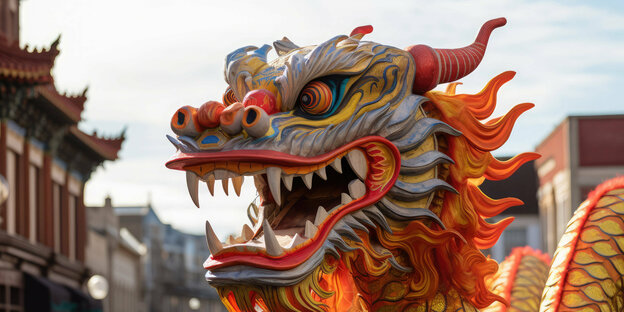The Year of the Dragon begins in China this weekend. About a mythological off-roader.

Dragons from (south)east Asia are often protectors and good luck charms. Photo: The Trio Studio/imago
At first glance, the dragon is something of the king among the twelve signs of the zodiac. A little better than ordinary people, a little exaggerated, a little outdated. And revered disproportionately for the fact that he doesn't actually do anything for his status.
Around the world, the dragon has long appeared on printed T-shirts, tattooed arms and unimaginative covers of current magazines, and in China, the cult and superstition even go so far that a baby boom is regularly recorded in years marked by the Dragon. Who wants a sheep or a child's rat when it can also be the imperial heraldic animal?
The dragon is a mythological all-rounder. It appears in numerous legends, religious writings, and pop culture adaptations, sometimes with important regional differences. In medieval circumstances, he becomes the gruesome antagonist of a human hero who must be killed on the way to rescue the virgin (category: Man with self-esteem problems potentially frees minors without asking and expects sex and marriage in return). In fantasy stories, he is an unpredictable risk factor who is accidentally awakened (the Hobbit category angers the Treasurer and unleashes an inferno).
And for children, people like to put a green monster on its short hind legs and thus make it approachable because it is human (Tabaluga category), or make its appearance resemble a poodle mix (Fuchur category).
The dragon is himself and so is the human being.

This text comes from Laborable day. Our left-wing weekly! Every week, wochentaz is about the world as it is and as it could be. A left-wing weekly with a voice, attitude and a special vision of the world. New every Saturday on newsstands and of course by subscription.
The ancient Greeks, on the other hand, spoke of multi-headed snake-like beasts, in Christianity there is a connection between dragons and the devil, and in the Hebrew Bible Leviathan, a hybrid dragon-like creature, is the latter god of god opponent in the battle for the world. In short, a quite threatening comrade.
Dragons from (south)east Asia, on the other hand, are often lucky charms and protectors. Although they are not all good, they do not breathe fire or kidnap princesses, but are water creatures that bring rain and fertility. A Chinese legend says that it was four sea dragons that transformed into the four great rivers of the country to free the people from drought. And in Indonesia, a dragon protects the fields from mice during the harvest.
What does all this ambivalence mean for the Year of the Dragon, which begins this Saturday?
The best thing about myths is that you can choose which one you like best. So why not hope for a good year of the dragon in which those who need it (refugees, climate, democracy) receive protection and those who deserve it (fascists, super-rich) have to fear it? And you don't have to limit yourself to hoping. The dragon is itself and, ultimately, so is the human being.